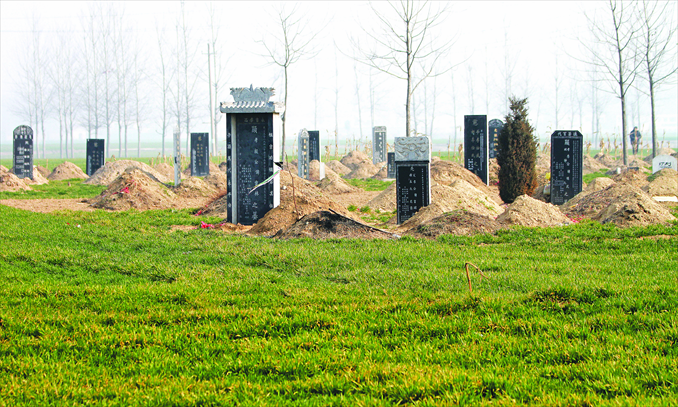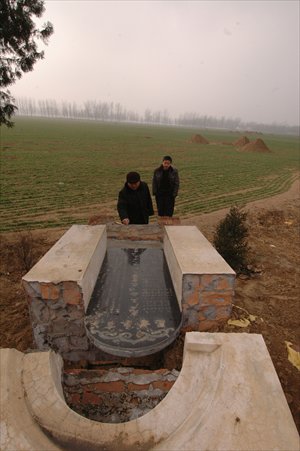Bringing back the dead

The graves of their ancestors are precious to Chinese people in many ways. Their enduring importance was shown when villagers in the city of Zhoukou, Henan Province secretly rebuilt tombs in the past few months. This came after the local government leveled numerous graves and relocated them in public cemeteries, claiming this was because the city needed new farmland.
At least 100,000 graves were rebuilt during the Spring Festival holiday, accounting for 7.7 percent of those leveled, official statistics from the Zhoukou Civil Affairs Bureau revealed.
The rebuilding of the graves comes as a counterattack after the controversial grave destruction campaign launched by the local government in February last year. In total, the campaign leveled over 2 million graves and reclaimed over 3 million hectares of farmland.
The campaign drew huge controversy from the public. The local government was accused of enforcing the law in a brutal and uncaring manner.
In November, the State Council amended the regulation on funeral and burial reform, banning local governments from leveling graves forcefully from May 1, 2013.
The city claimed the campaign had been arranged to maintain grain production levels and reclaim cultivated land, but local villagers retorted that authorities had showed no respect to the deceased or care for the feelings of the public.
The seesaw battle between the local government and the villagers continues today, highlighting the sensitivity of modern political actions when clashing with long-standing traditions.
Zhoukou, in the east of the province, was named by the central government as a main supplier of grain. "The central government has positioned Zhoukou as the breadbasket of the country, and it is our top priority to maintain grain production," Gong Changlin, deputy director of Zhoukou Civil Affairs Bureau, who took charge of the funerary reform, told the Global Times.
Zhoukou's grain production occupies one-seventh of Henan's provincial total, Xinhua reported. However, the available arable land per person is declining due to a population explosion and urbanization.
Tombs scattered across open farmland have seriously eroded the quality of the land and hampered the mechanization of farming, Gong pointed out.
Weight of the dead
Official statistics showed that over 3.5 million graves occupied nearly 50,000 hectares of farmland in Zhoukou, with over 60,000 new graves appearing each year in the city.
In order to accelerate the reclamation of farmland, the city government initiated the campaign last February to encourage local villagers to level graves, dig up and cremate remains and relocate them to public cemeteries.
But the local government's development strategy ran into local opposition.
"The good feng shui from ancestral graves is often thanked for bringing good fortune to families. Relocating the graves may change the feng shui, which could harm the families," said Zhang Zhenhua, a local villager in Taikang county.
Zhang leveled his family graves to be as low as 20 to 30 centimeters off the ground, but said he might rebuild them if other villagers do so during the Tomb-Sweeping Day in April.
In many villages of Taikang and Fugou counties, it is not uncommon for villagers to rebuild the graves during Spring Festival. In Taomuying village, administered by Taikang county, the entire village worked together to rebuild 160 graves less than two hours, the Beijing Youth Daily reported.
Some villagers said they don't oppose leveling graves but still felt the government could have taken their traditions into account.
"It is fine if we only level tombs that are over two generations old. But the graves of people whose children and grandchildren are still alive should be maintained," Zhang said.
Daliu village, located about 4 kilometers away from the center of Shangshui county, was set up as a model village for the campaign.
As part of the pilot program, Daliu's Party Secretary Guo Kui took the lead in leveling his ancestral graves where three generations of his family rested. After that, the campaign was rolled out across the village.
A majority of villagers expressed their unwillingness and guilt at disturbing their ancestors but felt that since the top village official had complied, they were left with no choice.
Even for Guo Kui, it was no easy task to persuade his entire family to give the nod to his initiative.
"It took me several days to persuade my brothers who disagreed with me. But the government always teaches us that Party members and leaders should take the lead in carrying out reform," Guo told the Global Times.
Liu Sanyang, a 32-year-old villager, didn't rebuild his ancestral graves, but instead dug fresh graves when his grandmother died last November and relocated his grandfather's body to rest with her.
"We wanted them to be reunited underground. Officials haven't asked me to level the new graves so far, but I'm worried they might ask me to level my grandma's grave in the coming months," Liu said, taking a deep drag from his cigarette.
Liu recalled his initial response to the government's call. His family's graves lay beside a provincial road and were earmarked for destruction. He did so despite his sadness and recalled that the graves seemed to "offend" the government. Liu's father burned offerings and begged the dead for forgiveness before helping to destroy the graves.
People who leveled graves before June 1 received a compensation of 200 yuan, but villagers said money meant nothing compared with the emotional cost.
"No one wanted to level the graves for 200 yuan. But you had to do it, no one could escape," Liu said, adding that "the local government warned us if we didn't level the graves, they would send the bulldozers."
No bulldozers were dispatched to level graves in Daliu village, but it was reported that certain villages in nearby Taikang county saw bulldozers deployed.
Going back on their word
Despite the local government promising they would cover all funeral expenses and provide free cemeteries, very few people relocated the bodies of their loved ones into public cemeteries across the counties of Taikang, Shangshui and Fugou.
Most villagers seemed unaware of these government pledges and many thought it would cost them to bury their ancestors in the cemeteries provided.
Located to the northwest of Daliu village, the cemetery covers an area of 4 hectares. It was opened at the end of last year, and consisted of two rooms housing urns for cremated remains and a third room for villagers to pay their respect to the dead before cremation.
The cemetery is expected to be able to house at least 2,000 remains.
However, only a dozen of villagers have relocated their family members to the cemetery, despite constant publicity from the local government.
"It is a very grave offence to dig up bodies from their graves and have them cremated, as it would cut off family ties," a villager in Daliu village told the Global Times.
Those villagers who lost family members since the cemetery open have been more amenable to having their funerals there.
"It is free and it is convenient to commemorate in the cemetery during Tomb-Sweeping Day," Wang Shuang, who buried his father-in-law in the cemetery last December, told the Global Times.
Little optimism
Tomb-Sweeping Day, a traditional holiday for honoring ancestors, will take place on April 4. Gong said he and other government officials are facing a lot of pressure as a new wave of grave rebuilding is expected around the day.
To prevent people from rebuilding graves, the local government plans to give out trees to villagers to commemorate Tomb-Sweeping Day. The idea is that villagers will plant the trees at the original spot of their ancestral graves as a marker and commemorate the dead ancestors under the tree.
"We admitted we have dealt with the problem forcibly and enforced the law brutally in some individual villages, but we will enhance publicity and accelerate the building of public cemeteries to alleviate public worries," Gong said.
In a recent official file released in early March, the Zhoukou municipal government promised they would need three years to complete the building of enough public cemeteries in rural areas and ensure all future deceased will be cremated. Gong also promised that for newly built and rebuilt graves, the law would be enforced but not violently. However, in Daliu, villagers are expecting a new attempt to level the graves and are standing ready.
